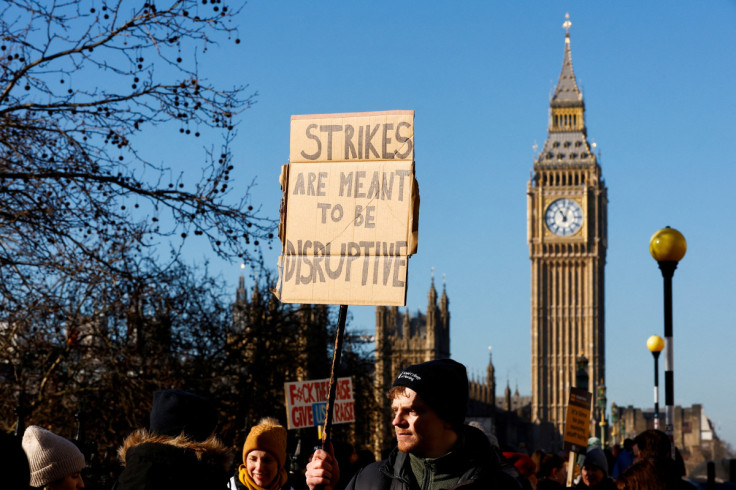Impact of NHS Strikes in England: Over 1 Million Appointments and Operations Rescheduled
Over the past 10 months, the National Health Service (NHS) in England has been grappling with a series of strikes by consultants and junior doctors, which have caused significant disruptions to patient care.

The National Health Service (NHS) in England is facing a healthcare crisis of unprecedented proportions as more than one million outpatient appointments and operations have been cancelled since strikes began in December.
The recent four-day stoppage by consultants and junior doctors has exacerbated the situation, pushing the total number of rescheduled "episodes of care" to just over one million, according to NHS England.
These disruptions have left patients and healthcare professionals alike grappling with the relentless impact of strikes and a growing sense of anxiety and frustration. In this comprehensive article, we delve into the repercussions of the strikes, explore the responses from NHS officials and healthcare leaders and examine potential solutions to this crisis.
The NHS, a cornerstone of healthcare in the United Kingdom, has been grappling with a severe crisis stemming from strikes by healthcare professionals. The strikes, which began in December, have disrupted the healthcare system to an unprecedented extent.
Last week's four-day stoppage by consultants and junior doctors alone forced hospitals to reschedule 129,913 additional episodes of care, taking the total to just over one million, according to NHS England.
Dr Vin Diwakar, the NHS national medical director for secondary care and transformation, acknowledged the gravity of the situation. He stated: "These figures reveal just part of the relentless impact of strikes over the last 10 months with the number of appointments rescheduled hitting more than one million."
Dr Diwakar emphasised the distress caused to patients and their families and highlighted the pressure on services that have intensified as junior doctors and consultants took joint action for the first time in NHS history.
The revelation that over one million episodes of care have been postponed has raised significant concerns among NHS officials and healthcare leaders. Rory Deighton, the director of the acute network at the NHS Confederation, described the figures as "a grim milestone".
He noted that the recent wave of coordinated industrial action by consultants and junior doctors had placed immense pressure on healthcare leaders and their teams to minimise disruption, resulting in a higher number of cancelled appointments and operations. Deighton pointed out that this joint strike action posed a high risk to patients and negatively impacted public health.
Moreover, the actual number of scrapped appointments may be even higher than the official tally, as hospitals are no longer booking appointments for strike days to avoid postponing and rearranging them. This practice, while intended to reduce disruption, leaves patients in limbo and adds to their uncertainty and anxiety.
Health Secretary Steve Barclay weighed in on the situation, using the same phrase to describe the one million figure as "a grim milestone". He criticised the British Medical Association, the primary doctors' union, for pushing ahead with "coordinated and calculated industrial action", which he argued created further disruption and misery for patients and NHS colleagues.
NHS Providers, an organisation representing health service trusts, highlighted that it is not only patients facing rescheduled appointments but also their families who are experiencing distress as a result. Saffron Cordery, Deputy Chief Executive of NHS Providers, emphasised that the fact that more than one million affected patients have had their care delayed should be reason enough for the strikes to end.
She stated: "Trust leaders understand only too well the distress this can bring them and their loved ones. Behind every delay, there is a real and human cost."
This disruption has not only affected patients' physical health but has also taken a toll on their mental and emotional well-being. Patients who initially tolerated the strikes have grown increasingly frustrated and anxious in recent months, which is evident in the rising number of complaints and concerns voiced by patients.
Lance McCarthy, the Chief Executive of the Princess Alexandra NHS Trust in Harlow, Essex, expressed concerns that the strikes were proving detrimental to staff, patients and the NHS as a whole. McCarthy pointed out that healthcare teams were constantly duplicating work, cancelling patients and rebooking the same patients, leading to inefficiencies and additional burdens on healthcare professionals.
Moreover, there has been a significant increase in anxiety, concern, and frustration among patients. Patients who initially understood the necessity of strikes are now feeling the impact of prolonged disruptions, which are having severe consequences on their health and well-being.
Health Secretary Steve Barclay recently announced that the government is considering introducing legal "minimum service levels" that would compel some doctors and nurses to work as normal, providing care on strike days. While this proposal is aimed at ensuring that essential healthcare services are maintained, it has been met with mixed reactions. Critics argue that it may further strain an already overworked healthcare workforce.
Another suggestion comes from Matthew Trainer, Chief Executive of the Barking, Havering, and Redbridge NHS Trust, who advocated for valuing healthcare professionals by offering appropriate compensation and improving working conditions. The trainer stressed the need for proper pay negotiations to avoid ongoing disputes, particularly as the healthcare system braces for the challenges of the winter season.
The ongoing strikes in the NHS in England have resulted in over one million cancelled outpatient appointments and operations, creating a healthcare crisis that continues to intensify. Patients, their families and healthcare professionals are experiencing the dire consequences of these disruptions.
In addition, the healthcare system, already under immense pressure due to the COVID-19 pandemic, is struggling to cope with the additional burden imposed by the strikes.
© Copyright IBTimes 2025. All rights reserved.






















